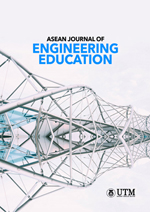Emotions and Course Learning Outcomes in Geology Fieldwork among Petroleum Engineering Undergraduates
DOI:
https://doi.org/10.11113/ajee2023.7n2.127Keywords:
geology fieldwork, petroleum engineering undergraduate, emotions, course learning outcomesAbstract
Quantitative approaches have been conducted on petroleum engineering students’ emotions before and after fieldwork experiences affected course learning outcomes. The study found positive-feelings experiences increased from pre-field to post-field such as confidence about what is expected and gladness that they are going to the field which is learning outside of the classroom. However, there is a small number of students worried before the fieldwork is conducted that they need to adapt to a new environment. Positive feeling experiences emotions shows a significant relationship with learning outcomes as compared to negative feelings; it has no significant value. Overall, the importance of these findings depends on improving awareness of the components that influence students' learning experiences and highlighting the importance of considering the complete spectrum of emotional and learning-related aspects into consideration when creating a fieldwork learning program.



















